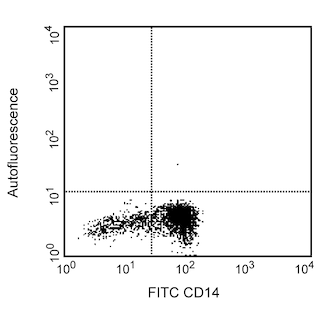Old Browser
This page has been recently translated and is available in French now.
Looks like you're visiting us from {countryName}.
Would you like to stay on the current country site or be switched to your country?
.png)
.png)
Regulatory Status Legend
Any use of products other than the permitted use without the express written authorization of Becton, Dickinson and Company is strictly prohibited.
Preparation And Storage
Product Notices
- Since applications vary, each investigator should titrate the reagent to obtain optimal results.
- Please refer to www.bdbiosciences.com/us/s/resources for technical protocols.
- For fluorochrome spectra and suitable instrument settings, please refer to our Multicolor Flow Cytometry web page at www.bdbiosciences.com/colors.
- Caution: Sodium azide yields highly toxic hydrazoic acid under acidic conditions. Dilute azide compounds in running water before discarding to avoid accumulation of potentially explosive deposits in plumbing.
The 34-5-8S antibody recognizes an epitope on the N-terminal domains, α1 and α2, of the H-2Dd. The mAb identifies a conformationally sensitive epitope of H-2Dd associated with β2 microglobulin; it fails to react with free H-2D[d] α chains synthesized in vitro. Weak cross-reactivity with cells from mice of the H-2b, H-2q, and H-2s haplotypes has been observed by flow cytometric analysis. Reactivity with other haplotypes (e.g., f, k, p, r) has not been observed. mAb 34-5-8S has been reported to block the recognition of H-2Dd by Ly-49A+, C+, F+, G2+, or I+ NK cells or transfectants.
This antibody is routinely tested by flow cytometric analysis. Other applications were tested at BD Biosciences Pharmingen during antibody development only or reported in the literature.

Development References (10)
-
Brennan J, Mahon G, Mager DL, Jefferies WA, Takei F. Recognition of class I major histocompatibility complex molecules by Ly-49: specificities and domain interactions. J Exp Med. 1996; 183(4):1553-1559. (Biology). View Reference
-
Chang CS, Kane KP. Evidence for sulfate modification of H-2Dd on N-linked carbohydrate(s): possible involvement in Ly-49A interaction. J Immunol. 1998; 160(9):4367-4374. (Biology). View Reference
-
Daniels BF, Karlhofer FM, Seaman WE, Yokoyama WM. A natural killer cell receptor specific for a major histocompatibility complex class I molecule. J Exp Med. 1994; 180(2):687-692. (Biology). View Reference
-
Evans GA, Margulies DH, Shykind B, Seidman JG, Ozato K. Exon shuffling: mapping polymorphic determinants on hybrid mouse transplantation antigens. Nature. 1982; 300(5894):755-757. (Biology). View Reference
-
Hanke T, Takizawa H, McMahon CW, et al. Direct assessment of MHC class I binding by seven Ly49 inhibitory NK cell receptors. Immunity. 1999; 11(1):67-77. (Biology). View Reference
-
Kane KP. Ly-49 mediates EL4 lymphoma adhesion to isolated class I major histocompatibility complex molecules. J Exp Med. 1994; 179(3):1011-1015. (Biology). View Reference
-
Mason LH, Ortaldo JR, Young HA, Kumar V, Bennett M, Anderson SK. Cloning and functional characteristics of murine large granular lymphocyte-1: a member of the Ly-49 gene family (Ly-49G2). J Exp Med. 1995; 182(2):293-303. (Biology). View Reference
-
Orihuela M, Margulies DH, Yokoyama WM. The natural killer cell receptor Ly-49A recognizes a peptide-induced conformational determinant on its major histocompatibility complex class I ligand. Proc Natl Acad Sci U S A. 1996; 93(21):11792-11797. (Biology). View Reference
-
Otten GR, Bikoff E, Ribaudo RK, Kozlowski S, Margulies DH, Germain RN. Peptide and beta 2-microglobulin regulation of cell surface MHC class I conformation and expression. J Immunol. 1992; 148(12):3723-3732. (Biology). View Reference
-
Ozato K, Sachs DH. Monoclonal antibodies to mouse MHC antigens. III. Hybridoma antibodies reacting to antigens of the H-2b haplotype reveal genetic control of isotype expression. J Immunol. 1981; 126(1):317-321. (Immunogen). View Reference
Please refer to Support Documents for Quality Certificates
Global - Refer to manufacturer's instructions for use and related User Manuals and Technical data sheets before using this products as described
Comparisons, where applicable, are made against older BD Technology, manual methods or are general performance claims. Comparisons are not made against non-BD technologies, unless otherwise noted.
For Research Use Only. Not for use in diagnostic or therapeutic procedures.
Report a Site Issue
This form is intended to help us improve our website experience. For other support, please visit our Contact Us page.
